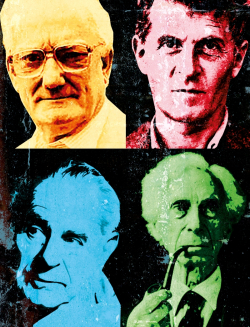Jason Cowley in New Statesman:
 One summer afternoon in 1997, on assignment for the Times, I visited Bryan Magee at his flat in Kensington, west London. I read philosophy at university in the late 1980s and my understanding of the subject was transformed through watching Magee’s BBC Two series The Great Philosophers (1987) and then reading the subsequent book adapted from it. He is unsurpassed in the postwar period in Britain as a populariser of philosophy, and I learned more from the 15 episodes of that series as well as the book than from any lecture or seminar I attended. It achieved, as the philosopher and biographer Ray Monk has written, the near-impossible feat of presenting to a mass audience the recondite issues of philosophy without the loss either of accessibility or intellectual integrity. The format was extraordinarily simple. Magee sat alongside an eminent philosopher (“two boffins on a sofa” was how the Guardian’s witty TV critic Nancy Banks-Smith described the set-up in a favourable review) and together they interrogated the work of one of the greats: Plato, Aristotle, Descartes, Hume, Kant, Wittgenstein, and so on. Magee asked the questions and clarified or summarised the replies. The series was revelatory – at least to me. So, this is how to read and talk about philosophy!
One summer afternoon in 1997, on assignment for the Times, I visited Bryan Magee at his flat in Kensington, west London. I read philosophy at university in the late 1980s and my understanding of the subject was transformed through watching Magee’s BBC Two series The Great Philosophers (1987) and then reading the subsequent book adapted from it. He is unsurpassed in the postwar period in Britain as a populariser of philosophy, and I learned more from the 15 episodes of that series as well as the book than from any lecture or seminar I attended. It achieved, as the philosopher and biographer Ray Monk has written, the near-impossible feat of presenting to a mass audience the recondite issues of philosophy without the loss either of accessibility or intellectual integrity. The format was extraordinarily simple. Magee sat alongside an eminent philosopher (“two boffins on a sofa” was how the Guardian’s witty TV critic Nancy Banks-Smith described the set-up in a favourable review) and together they interrogated the work of one of the greats: Plato, Aristotle, Descartes, Hume, Kant, Wittgenstein, and so on. Magee asked the questions and clarified or summarised the replies. The series was revelatory – at least to me. So, this is how to read and talk about philosophy!
Magee and I chatted for a couple of hours that afternoon as bright sunshine streamed through the high windows of his sitting room. What I liked about his approach was his willingness to demystify philosophical problems by demonstrating that they were not theoretical but existential – about the nature of reality, encountered in the course of living. Yet as I prepared to leave that afternoon, Magee, who through choice lived alone having once been briefly married, said something that I’ve never forgotten. “I get the impression,” he said, “that you feel I am lonely and unfulfilled.” There was some truth in this: he did seem unfulfilled, and not because he lived alone. There was something restless in his manner: an irritable reaching after fact and reason, as Keats wrote in a different context. And he’d never committed himself fully to one discipline, preferring instead to occupy many different public roles as a broadcaster, politician, teacher, author and poet. And he told me – he was 67 at the time – that he believed himself still to be capable of “doing great things”. He used a German word to describe how he felt about his own potential, Machtgefühl. Macht = power, Gefühl = feeling or sense. So, in broad translation, Machtgefühl: a feeling of or having a sense of power. I have also seen the word translated as “feeling of superiority” (even though I haven’t seen macht translated as “superiority”).
As an impressionable younger man, I was pretty impressed by what Magee had achieved already. What more could he do or have done? Why even now such restlessness and vaulting ambition? In his book, Confessions of a Philosopher (1997), which is a history of Western philosophy told through his own intellectual journey, Magee offers what could be a partial answer to these questions when he describes how in his late thirties, despite having a passionate attachment to life, he was driven to the edge of mental illness, even suicide, by metaphysical terror. He learned to control his terror, which, though he did not say so, recalled Blaise Pascal’s fear of “immensity of spaces which I know not and which know not me”, through reading the writings of others, notably Arthur Schopenhauer. “I think the feeling of meaninglessness is worst of all, worse than the fear of death itself,” Magee said. “The feeling that nothing matters, that there’s no point to anything. Certainly, I have experiences, in the forms of extreme existential terror, states of mind that bordered on the intolerable.”
More here.
Four years ago, Barbara Ehrenreich, 76, reached the realisation that she was old enough to die. Not that the author, journalist and political activist was sick; she just didn’t want to spoil the time she had left undergoing myriad preventive medical tests or restricting her diet in pursuit of a longer life.
